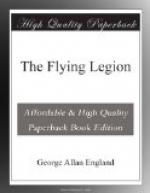“Mineralogically speaking, this is a meteor or a block of volcanic basalt,” judged the Master. “It seems sprinkled with small crystals, with rhombs of tile-red feldspath on a dark background like velvet or charcoal, except for one reddish protuberance of an unknown substance. A good blow with a hammer would surely break it along the original lines of fracture—and this is well worth knowing and remembering”.
“Well, so far so good,” he concluded. “The Air Control Board hasn’t got us, yet. Neither have the Mohammedans. True, we’ve lost a number of men, but that was to have been expected. That’s inevitable, and we still have enough. I hardly see that we have so very much to complain of, so far.”
He turned, pulled a blanket from his berth and carefully spread it over the loot on the table. Then he pushed the button communicating with the cabin wherein Rrisa was still quivering as a result of having heard the fusillades and the terrific tumult—unseen though they had been to him—at Mecca.
In a couple of minutes the faithful orderly appeared, salaamed, and stood waiting with a drawn, troubled face.
“Allah m’a!” the Master greeted him, in Allah’s name inquiring for his good health. “I have something important to ask thee. Come in. Come in, and close the door.”
He spoke in Arabic. The orderly, in the same tongue, made answer as he obeyed:
“The Master hath but to talk, and it is answered, if my knowledge can suffice.” His words were submissive; but the expression was strange in his eyes, at sight of the blanket on the table. That blanket might hide—what might it not hide? The light in his gaze became one the Master had never yet seen there, not even in the sternest fighting at Gallipoli.
“Mecca lieth behind us, Rrisa,” the Master began. “Thou hast seen nothing of it, or of what happened there?”
“Nothing, M’alme. I was bidden remain in my cabin, and the Master’s word is always my law. It is true that I heard sounds of a great fighting, but I obeyed the Master. I saw nothing. The Sheik Abd el Hareth, did you deliver him into the hands of the Faithful?”
“No, Rrisa. They refused to accept him. And now I have other plans for him. It is well that thou didst see nothing, for it was a mighty fighting and there was death both to them and to us. Now, my questions to thee.”
“Yea, Master?”
“Tell me this thing, first. Is it indeed true speaking, as I have heard, that the Caliph el Walid the First, in Hegira 88, sent to Mecca an immense present of gold and silver, forty camel-loads of small cut gems and a hundred thousand miskals in gold coin?”
“It is true, Master. Save that he sent more; nearly two hundred thousand miskals. He also sent eighty Coptic and Greek artists to carve and gild the mosques.
“One Greek sculptured a hog on the Mosque of Omar, trying to make it into a kanisah (unclean idol-house). My people discovered the sacrilege, and”—he added with intent—“gave that Greek the bowstring, then quartered the body and threw it to the vultures.”




